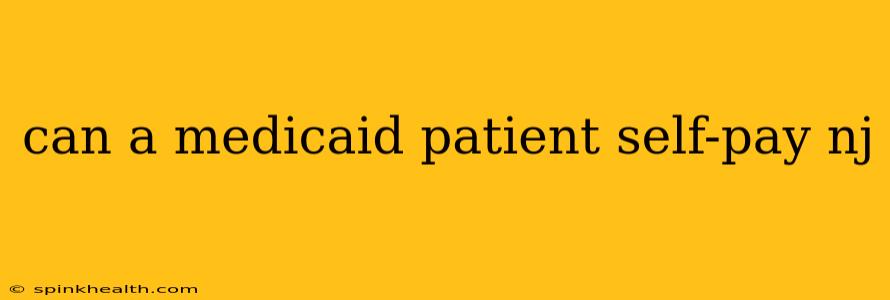Can a Medicaid Patient Self-Pay in New Jersey? Navigating Healthcare Costs
The question of whether a Medicaid patient in New Jersey can self-pay for medical services is a nuanced one, and the answer isn't a simple yes or no. It depends on several factors, and understanding these factors is crucial for both patients and healthcare providers. Let's unravel this complexity through a storytelling approach, exploring the common scenarios and potential outcomes.
Imagine Sarah, a New Jersey resident enrolled in Medicaid. She recently experienced a sudden illness requiring an emergency room visit. The care she received was extensive, resulting in a hefty bill. While Medicaid covers a significant portion of her medical expenses, could Sarah choose to self-pay for a part of, or even the entire, bill?
The short answer is: it's complicated. While Medicaid is designed to cover the majority of healthcare costs for eligible individuals, there are circumstances where self-paying, or supplementing Medicaid coverage, might arise.
Can a Medicaid recipient in NJ pay out-of-pocket for services covered by Medicaid?
This is a key question that often arises. Generally, no, a Medicaid recipient shouldn't be required to pay for services already covered under their Medicaid plan. Medicaid is intended to be the primary payer. However, there can be exceptions. For example:
-
Copays and Coinsurance: Some Medicaid plans may require small co-pays or co-insurance for certain services. These are typically minimal amounts, but they represent a form of self-payment. These amounts vary based on the specific Medicaid plan and the service provided.
-
Non-Covered Services: Medicaid doesn't cover all medical services. If Sarah needed a procedure or treatment not included in her Medicaid benefits, she would have to self-pay for that portion.
-
Balance Billing: While rare with Medicaid, balance billing occurs when a provider charges more than the Medicaid reimbursement rate. In theory, Sarah shouldn't be responsible for this difference, but in practice, situations might arise where it happens unintentionally or due to billing errors. This is an area where patient advocacy is crucial.
-
Convenience: Some individuals might choose to self-pay for convenience, even if the service is covered by Medicaid. This might be for faster appointment scheduling or to avoid potential administrative hassles with the Medicaid system.
What happens if a Medicaid beneficiary in NJ pays out of pocket?
If Sarah were to self-pay for a service covered by her Medicaid plan, she generally wouldn’t receive reimbursement from Medicaid. The payment might be considered an overpayment, or it might just be lost. Therefore, it's essential to clarify with the provider before any payment if the service is covered, and the appropriate billing process.
How can I avoid issues with Medicaid and self-paying in NJ?
Preventing confusion and potential financial losses requires proactive steps:
- Verify Coverage: Always confirm with your Medicaid provider and the healthcare provider that a service is covered before receiving it. This prevents unexpected bills.
- Understand Your Plan: Familiarize yourself with your specific Medicaid plan's coverage details, including co-pays, co-insurance, and any exclusions.
- Obtain Itemized Bills: Request itemized bills for all services. This makes it easier to understand the charges and ensure accuracy.
- Contact the NJ Department of Human Services: If you face billing issues or have questions regarding Medicaid coverage, contact the NJ Department of Human Services for assistance.
In Sarah's case, clear communication with her healthcare provider and an understanding of her Medicaid plan would have prevented any potential confusion or unnecessary self-payment. Remembering that Medicaid aims to be the primary payer and proactively seeking clarity ensures she can access healthcare without facing unexpected financial burdens. Navigating the healthcare system can be challenging, but proactive engagement and communication can significantly improve the experience.

